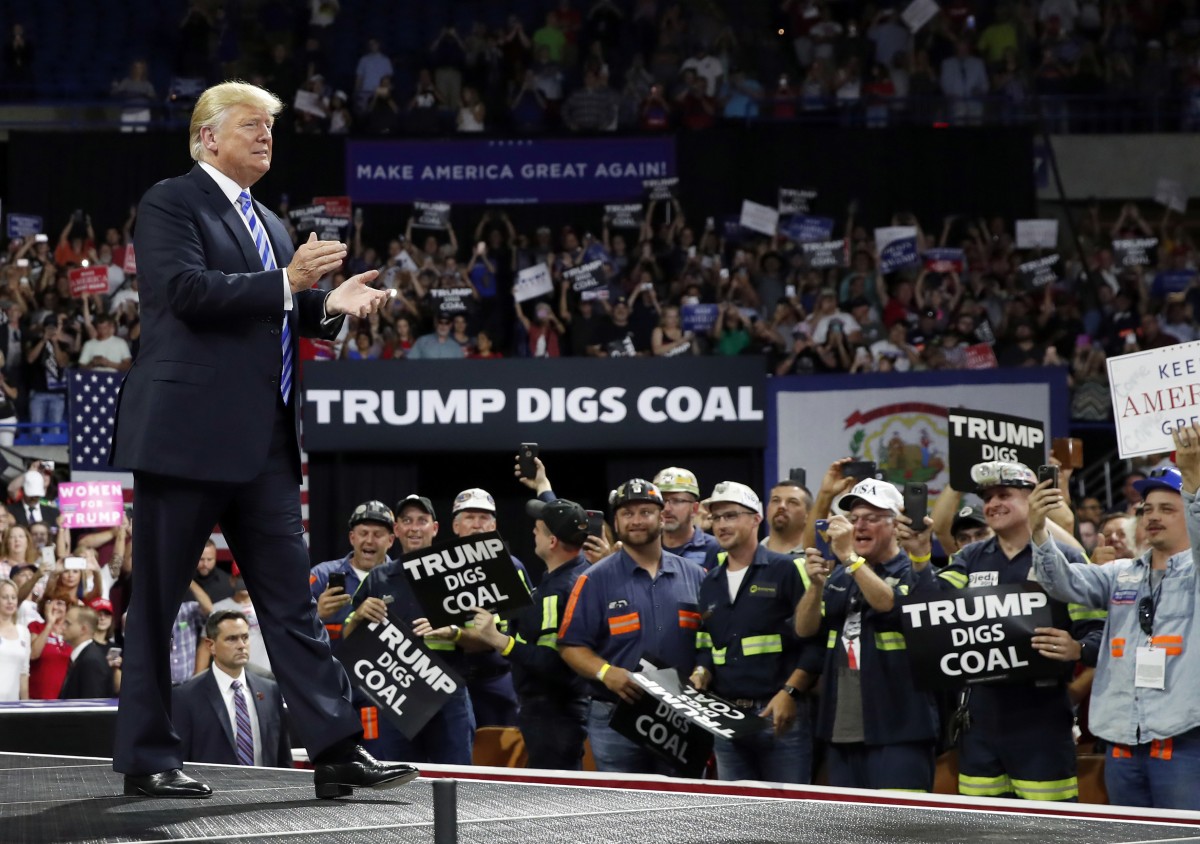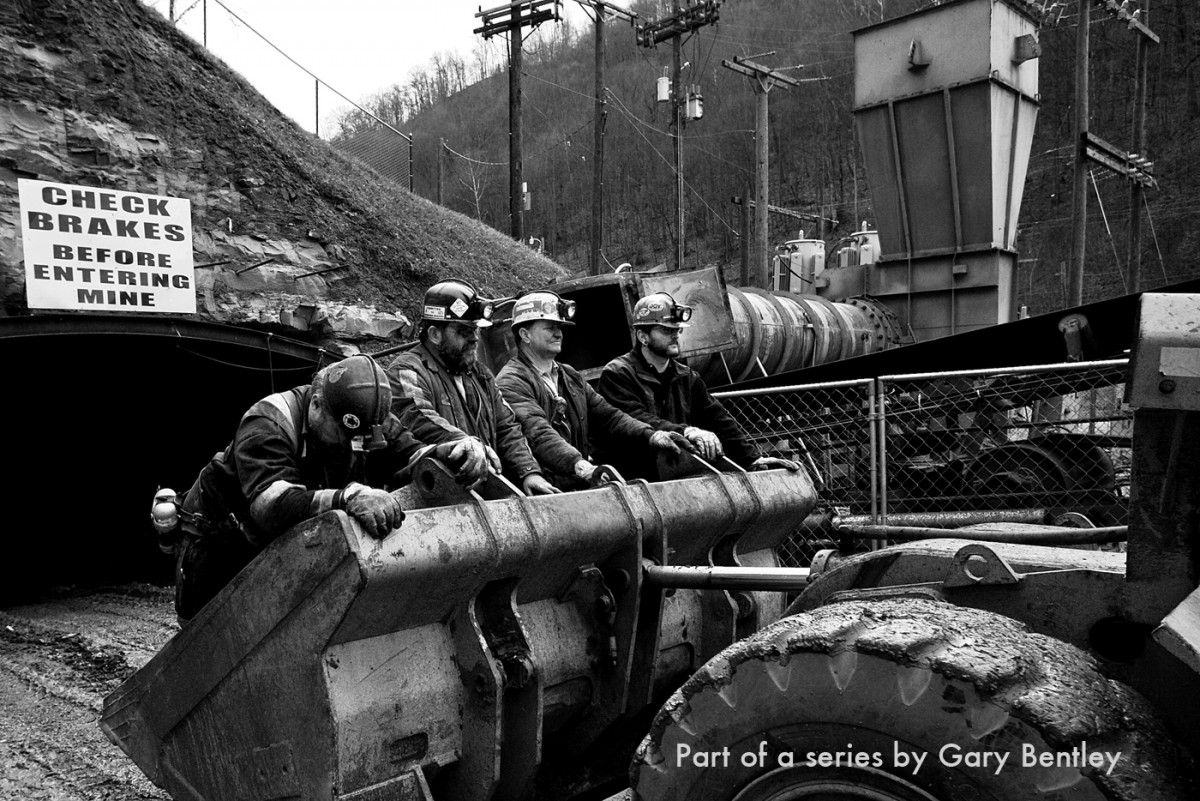A little more than two years ago, then-presidential candidate Donald Trump came to Charleston for a rally and made a promise to West Virginia’s coal miners:
“We’re going to put the miners back to work, we’re going to put the miners back to work. We’re gonna get those mines back open,” Trump said in 2016.
As the Trump administration continues to promise a rebound to the coal industry by walking back Obama administration rules, experts say those regulatory rollbacks still will not prompt a resurgence of the industry.
Trump announced plans to roll back Obama-era regulations on coal-fired power plants at a Charleston rally Tuesday night, where he was scheduled to stump for Republican West Virginia Attorney General Patrick Morrisey, who is running for U.S. Senate.
The Trump administration’s rules most likely would leave it up to states to handle emission standards, giving coal plants an incentive to stay open longer.
But those effects will not last long, experts said.
“All it does is to delay the closure or conversion of some existing coal plants,” said Michael Gerrard, who teaches environmental law and energy regulation at Columbia Law School. “If they had to comply with the Clean Power Plan as released by the Obama administration, many utilities would be required to go to more use of natural gas and renewables, so this will delay that impact.”
Despite Trump’s repeated promise to fight the “war on coal,” it is not regulations, but cheaper natural gas, that has hurt the industry, experts say.
“Killing the Clean Power Plan will not bring coal back, because the Clean Power Plan did not kill coal. It’s still economics,” West Virginia University law professor James Van Nostrand said.
A report published last week by WVU’s College of Business and Economics predicts a short-term dip and long-term decline in coal production. According to the forecast, overall state output is expected to decline about 3 percent each year for the next two years and see more dramatic declines in output by the end of the 2030s.
Coal miners listen as President Donald Trump speaks during a rally Tuesday, Aug. 21, 2018, in Charleston, WV. Photo: Associated Press.
“Southern West Virginia’s production should be buoyed by what is expected to be fairly stable levels of export demand, but output is likely to trend lower during the outlook as a growing portion of the region’s reserves become unprofitable to recover,” the report said.
Of course, it’s a forecast, said Brian Lego, co-author of the study and research assistant professor at WVU. Some changes in regulatory policy can move the needle slightly and could keep some coal-fired power plants open for a while longer, but it ultimately will be hard to compete with cheaper options.
“That’s something that’s going to be hard to overcome, even with a regulatory response like this, the market realities are still going to be right there,” Lego said. “And to try to flip that on its head, I don’t know how it’s going to be overcome, in most cases.”
President Barack Obama’s Clean Power Plan aimed to reduce carbon dioxide emissions, but it remains stayed after being challenged by Morrisey and other critics of the regulations.
West Virginia’s role in staying the Clean Power Plan maade Tuesday’s event a perfect place to unveil the new plan, said West Virginia Coal Association President Bill Raney.
“I think its a perfect environment because West Virginia was so instrumental in getting the stay from the Supreme Court,” Raney said.
It makes more sense, he said, to put emission standards in states’ hands, and not under the control of people in Washington, D.C.
“I just feel like the states know a whole lot more, the ones who have coal-burning utilities in there,” he said.
The West Virginia Department of Environmental Protection did not respond to a request for comment Monday, but DEP Secretary Austin Caperton has, in the past, said he feels “personally mixed” on the issue of climate change.
That’s troubling, said Ken Kimmell, president of the Union of Concerned Scientists. Rolling back emission standards on coal-fired power plants sends a message to the rest of the world that the country isn’t as concerned about climate change, he said.
“I would call it yet another wrecking ball that’s being slung at a modest but important rule that was put in place by President Obama to help accelerate the transition to cleaner forms of energy,” Kimmell said.
Ultimately, he agreed, utility companies will still shift to natural gas or renewable energy.
“It’s unfortunate, because I think peoples’ hopes were raised in a cruel way by Trump,” Van Nostrand said. “But I don’t think our politicians have done a service to our citizens either by continuing to blame the EPA, because they know it’s broader forces at issue. They know we need to transition away from coal to other sources.”
This article was originally published by the Charleston Gazette-Mail.



